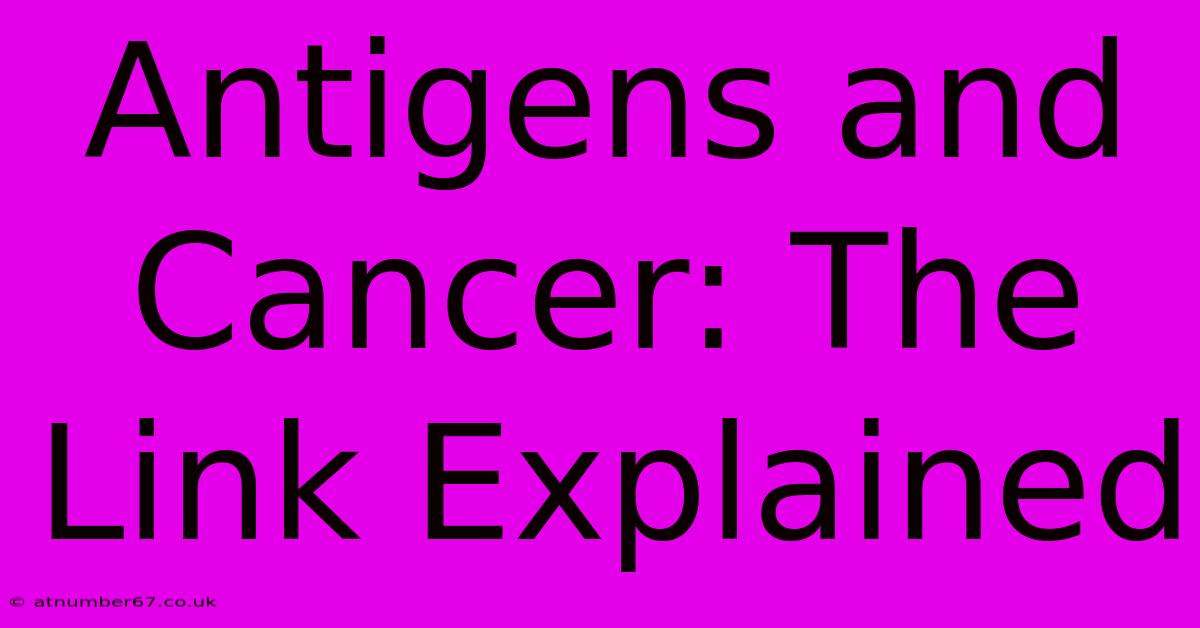Antigens And Cancer: The Link Explained

Table of Contents
Antigens and Cancer: The Link Explained
Understanding the relationship between antigens and cancer is crucial for comprehending how our immune system fights the disease and how innovative cancer therapies are developed. This article will delve into the complexities of this relationship, exploring what antigens are, how they relate to cancer cells, and the implications for diagnosis and treatment.
What are Antigens?
Simply put, antigens are substances that trigger an immune response. Our immune system recognizes these foreign invaders and mounts a defense to neutralize or eliminate them. These invaders can be anything from bacteria and viruses to pollen or even transplanted organs. Crucially, they can also be cancer cells.
Tumor-Specific Antigens (TSAs) vs. Tumor-Associated Antigens (TAAs)
When it comes to cancer, we differentiate between two main types of antigens:
-
Tumor-Specific Antigens (TSAs): These are unique to cancer cells and are not found on normal cells. Identifying TSAs is a holy grail in cancer research, as they represent ideal targets for highly specific immunotherapies. Unfortunately, TSAs are relatively rare.
-
Tumor-Associated Antigens (TAAs): These are found on both cancer cells and some normal cells, albeit often at different levels or in different contexts. While not as specific as TSAs, TAAs are more common and still serve as valuable targets for cancer therapies. Examples of TAAs include proteins involved in cell growth, repair, and differentiation.
How Cancer Cells Evade the Immune System
Despite the presence of antigens on cancer cells, the body's immune system doesn't always effectively eliminate them. Cancer cells employ several clever strategies to evade detection and destruction:
-
Weak antigenicity: Some cancer-associated antigens may be weakly immunogenic, meaning they don't trigger a strong enough immune response.
-
Antigen masking: Cancer cells can hide their antigens, making them less visible to the immune system.
-
Immune suppression: Cancer cells can suppress the immune system, reducing its ability to recognize and attack them. They may release molecules that directly inhibit immune cells or alter the immune system's microenvironment.
Antigens and Cancer Diagnosis
Antigens play a vital role in diagnosing cancer. Techniques such as:
-
Blood tests: Detecting elevated levels of certain cancer antigens in the blood (tumor markers) can indicate the presence of cancer or monitor its progression. Examples include PSA (prostate-specific antigen) and CA-125 (ovarian cancer marker). It is important to note that elevated levels of these markers don't always confirm cancer; further investigations are necessary.
-
Immunohistochemistry (IHC): This laboratory technique uses antibodies to detect specific antigens within tissue samples, aiding in cancer diagnosis and grading. IHC helps determine the type and stage of cancer.
Antigens and Cancer Treatment
The understanding of tumor antigens has revolutionized cancer treatment, particularly through immunotherapy. Immunotherapy harnesses the power of the immune system to fight cancer. Several strategies leverage antigens:
-
Cancer vaccines: These vaccines aim to stimulate the immune system to recognize and attack cancer cells based on their antigens.
-
Checkpoint inhibitors: These drugs block proteins that cancer cells use to suppress the immune system, enabling the immune system to better recognize and destroy cancer cells.
-
Adoptive cell transfer: This involves removing immune cells from the patient, modifying them to enhance their ability to recognize cancer cells, and then infusing them back into the patient.
-
Oncolytic viruses: These are engineered viruses that selectively infect and destroy cancer cells while leaving healthy cells unharmed. They may also enhance the immune response against cancer cells by releasing tumor antigens.
Conclusion
The relationship between antigens and cancer is complex but crucial to understanding both the disease's mechanisms and its treatment. Ongoing research into tumor antigens is constantly revealing new avenues for improved cancer diagnosis and the development of more effective, targeted therapies. The future of cancer treatment is increasingly intertwined with our ability to exploit the immune system's power to recognize and eliminate cancer cells based on their unique antigenic signatures.

Thank you for visiting our website wich cover about Antigens And Cancer: The Link Explained. We hope the information provided has been useful to you. Feel free to contact us if you have any questions or need further assistance. See you next time and dont miss to bookmark.
Featured Posts
-
How Lee Hyeri Built Her Multi Million Dollar Empire
Apr 06, 2025
-
Santner Age Beyond Expectations
Apr 06, 2025
-
The Practical Application Of Estado Gobierno And Nacion
Apr 06, 2025
-
Brian Littrells Son Navigating The World Of Social Media
Apr 06, 2025
-
Dads Story A Treasure To Be Cherished
Apr 06, 2025
